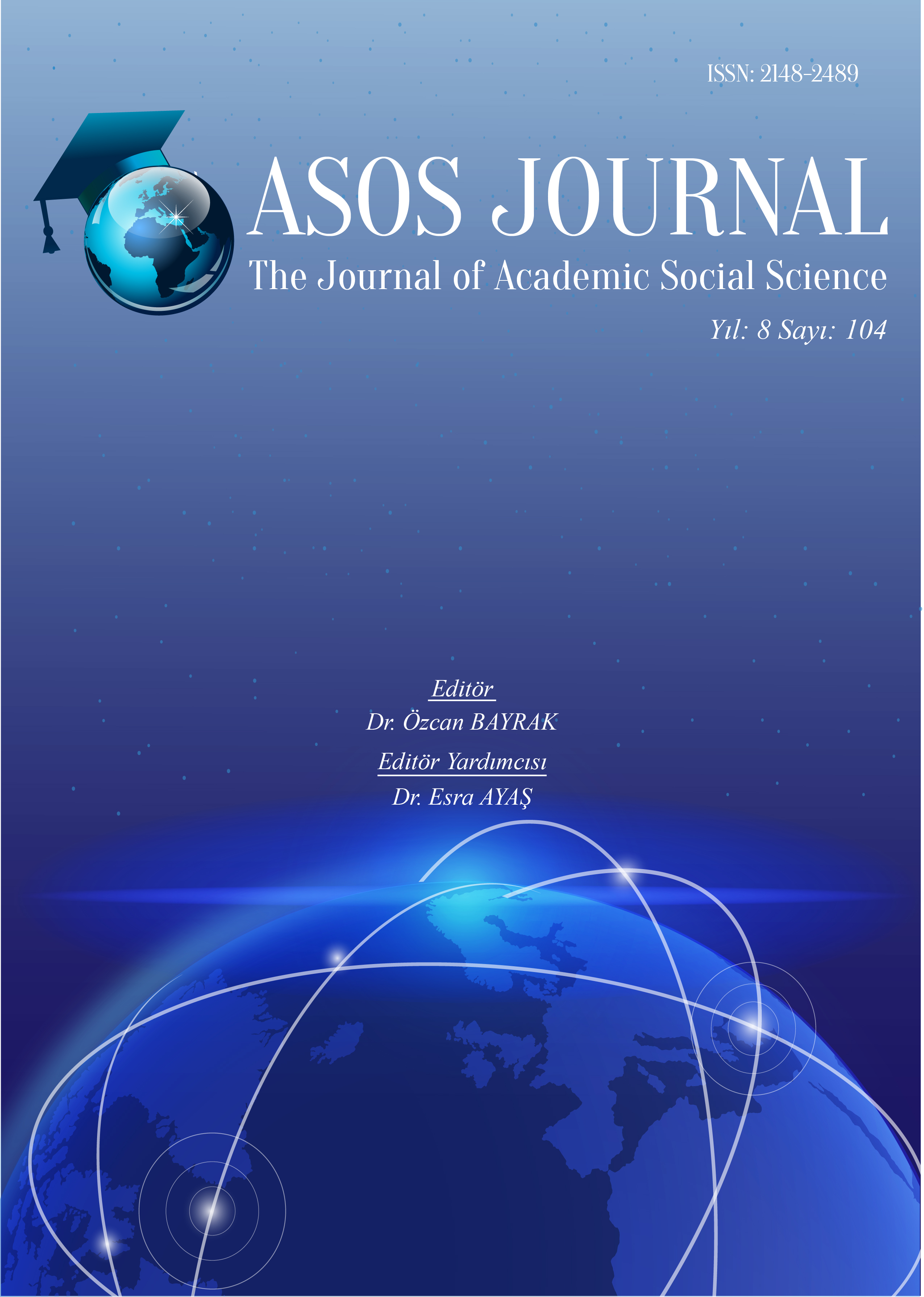Author :
Abstract
Globalleşen piyasada ürün alternatiflerinin artması ve tüketicinin bu alternatiflerden birini seçmesi karmaşık ve zor bir hal almıştır. Sağlıklı bir toplum ve ekonominin oluşması etik ve sosyal sorumluluk bilinci ile paraleldir. Dolayısıyla işletmeler kadar tüketicilere de görev düşmektedir. Buradan hareketle bu çalışmada, tüketicilerin tüketici etiği konusundaki algılamaları ölçülmüş ve kullanmış oldukları markayı ne denli tanıdıkları belirlenmeye çalışılmıştır. Böylece, tüketicilerin tüketici etiği temel alınarak hangi davranışları kabul edip etmediği tespit edilmeye çalışılmıştır. Bu çalışmada, marka kişilik boyutları ve etik algılar arasındaki ilişkiler incelenmeye çabalanmıştır. Bu kapsamda anket formu ile bilgiler toplanmış ve bireyler, demografik özellikleri baz alınarak tüketici etiğinin algılanışı açısından değerlendirilmiş ve tüketici etiğinin oluşumuna yön veren faktörler belirlenmeye çalışılmıştır.
Keywords
Abstract
It has become complicated and difficult for product alternatives to increase in the globalizing market and for the consumer to choose one of these alternatives. The formation of a healthy society and economy is in line with the ethical and social responsibility awareness. Therefore, consumers have a duty as well as businesses. Thus, in this study, the perceptions of consumers about consumer ethics were measured and it was tried to determine how they knew the brand they used. Thus, it was tried to be determined whether the consumers accepted the behaviors based on consumer ethics. In this study, the relationships between brand personality dimensions and ethical perceptions are tried to be examined. In this context, information was collected with the questionnaire form and individuals were evaluated in terms of the perception of consumer ethics based on their demographic characteristics and factors that guided the formation of consumer ethics were tried to be determined.
Keywords
- Aaker, Jennifer, (1997), "Dimensions of Brand Personality," Journal of Marketing Research, 34 (August), 347-356.
- Al-Khatib Jamal A.; VITELL Scott J. and RAWWAS Mohammed Y. A.; (1997), “Consumer Ethics: A Cross-Cultural Investigation”, European Journal of Marketing, 31/11-12, 750
- Atay, Ş, (2016), “Tüketicilerin Etik Algılamaları Üzerinde Demografik Faktörlerin Etkisinin Araştırılmasına Yönelik Bir Araştırma”, Ardahan Üniversitesi İktisadi ve İdari Bilimler Fakültesi Dergisi, 3, 201-215.
- Bray, J., Johns, N., ve Kilburn, D. (2011). An Exploratory Study into the Factors Impeding Et- hical Consumption. Journal of Business Ethics, 597-608.
- Brinkmann, J, (2004), “Looking At Consumer Behavior in a Moral Perspective”, Journal of Business Ethics, 51/2, 129-141.
- El-Bassiouny Noha, (2013), “What Makes the Ethical Consumer?”, https://repository.salaamgateway.com/images/iep/galleries/documents/20160731 0756087527.pdf, Erişim Tarihi: 18.06.2018.
- Forsyth Donelson R.; (1980), “A Taxonomy of Ethical Ideologies”, Journal of Personality and Social Psychology, 39/1, 175-184.
- Hofstede, G. (1983), “The cultural relativity of organizational practices and theories”, Journal of International Business Studies, Fall, 80-95.
- Iwanow, H., McEachern, M., ve Jeffrey, A. (2005). The influence of ethical trading policies on consumer apparel purchase decisions: A focus on The Gap Inc. International Journal of Retail ve Distribution Management, 371-387.
- Joergens, C. (2006). Ethical Fashion: Myth or Future Trend? Journal of Fashion Marketing ve Marketing, 360-371.
- Kavak, B, (2001), Rol Farklılaşmasının Ahlaki Yargılar Üzerindeki Etkisi: Tüketici Ahlakı ve İş Ahlakı Çerçevesine Karşılaştırmalı Bir Araştırma, Hacettepe Üniversitesi İİBF Dergisi, 19(2), 79-96.
- Levin Aron M.; Dato-On Mary Conway and Rhee Kenneth; (2004), “Money For Nothing And Hits For Free: The Ethics Of Downloading Music From Peer-ToPeer Web Sites”, Journal of Marketing Theory and Practice, Volume: 12, Issue: 1, pp. 48-60.
- Jean-Ruel, Emilie (2008), “The Effect of Ethical Attributes on Brand Personality and Consu- mer-Brand Relationships”, Ph.Thesis, Concordia University, Montreal, Quebec, Canada.
- Muncy James A. and Vitell Scott J.; (1992), “Consumer Ethics: An Investigation of The Ethical Beliefs Of The Final Consumer”, Journal of Business Research, 24/4, 297-311.
- Nardalı, S., Etik Dışı Tüketici Davranışları (C. Ay, B. Kartal, & S. Nardalı içinde, Pazarlamada Etik Yaklaşımlar, 307-334), Ankara: Detay Yayıncılık, 2010.
- Oliver, F. ve McGoldrick, P., Motivations of the Ethical Consumer, Journal of Business Ethics (79), 445-467, 2008.
- Oyman, M. (2004). “Tüketici etiği: Ülkelerarası karşılaştırmalara ve demografik faktörlere da- yalı bir araştırma”, Eskişehir Osmangazi Üniversitesi Sosyal Bilimler Dergisi, 5/2, 77
- Özdoğan F. Bahar; (2007), Pazarlamada Tüketim ve Tüketici Ahlakı, Mahmut Arslan (Ed.), Siyasal Kitabevi, Ankara.
- Pieper Annemarie; (2012), Etiğe Giriş, Çev. Veysel Atayman ve Gönül Sezer, İkinci Basım, Ayrıntı Yayınları, İstanbul.
- Polonsky, M. J., Brito, P. Q., Pinto, J.,Higgs-Kleyn, N. (2001). “Consumer Ethics in the Euro- pean Union: A Comparison of Northern and SouthernViews”, Journal of Business Ethics, 31, 117-130.
- Rao C. P. and Al-Wugayan Adel A.; (2005), “Gender and Cultural Differences in Consumer Ethics in a Consumer-Retailer Interaction Context”, Journal of International Consumer Marketing, 18/1-2, 45-71.
- Rawwas Mohammed Y. A.; (2001), “Culture, Personality and Morality A Typology of Interna- tional Consumers’ Ethical Beliefs”, International Marketing Review, 18/2, 18.
- Rawwas, M. Y. A.,Swaidan, Z., Oyman, M. (2005). “Consumer Ethics: A Cross-Cultural Study of The Ethical Beliefs of Turkish and American Consumers”, Journal of Business Ethics, 57: 183-195.
- Roberts, J. A. (1996), Will the Real Socially Responsible Consumer Please Step?, Business Horizons, 39(1), 79-88.
- Schermelleh-Engel; K., Moosbrugger, H. & Müler, H. (2003). Evaluating the fit of structural equation models: Tests of significance and descriptive goodness-of-fiteasures. Methods of Psychological Research, 8, 23-74.
- Sönmez Nagehan; (2003), Pazarlama Etiği ve Tüketici Etiğinin Turizm Sektöründe Değerlendi- rilmesi: Konaklama İşletmelerinin Yiyecek-İçecek Bölümlerine Yönelik Ampirik Bir Uygulama, Hacettepe Üniversitesi Sosyal Bilimler Enstitüsü Yayımlanmamış Yüksek Lisans Tezi, Ankara.
- Torlak Ömer; (2009), Pazarlama Ahlakı Sosyal Sorumluluklar Ekseninde Pazarlama Kararları ve Tüketici Davranışlarının Analizi, Beşinci Baskı, Beta Basım Yayım, İstanbul.
- Velioğlu, M. N.,Pazarlamada Etik Karar Alma Davranışına Yönelik Bir Model, Yayımlanma- mış Doktora Tezi, Eskişehir: Anadolu Üniversitesi Sosyal Bilimler Enstitüsü, 2002.
- Vitell, S. ve Ho, F. N.,EthicalDecisionMaking in Marketing: A Synthesisand Evaluation of Sca- lesMeasuringtheVarious Components of DecisionMaking in EthicalSituations,Journal of Business Ethics, 16(16), 699-717, 1997.
- Vitell Scott J.; (2003), “Consumer Ethics Research: Review, Synthesis and Suggestions For The Future”, Journal of Business Ethics, 43/1-2, 33-47.
- Vitell, S. J.,Muncy, J. (2005). “The Muncy-Vitell Consumer Ethics Scale: A Modification and Application”, Journal of Business Ethics, 62, 267-275.
